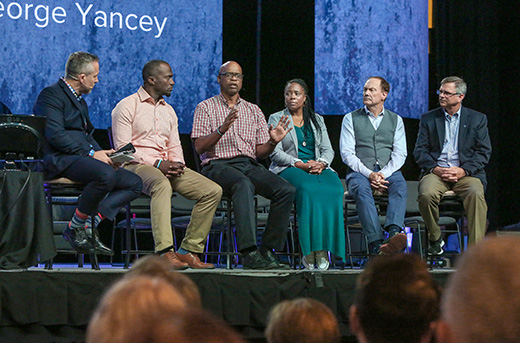Sociology professor, researcher and author George Yancey always steps back when he knocks on a door. A 6-foot-3-inch African-American, he says his appearance strikes societal fear.
Seminary assistant dean and director Missie Branch says she also encounters difficulties because she is an African-American woman. She says she’s either overlooked or viewed through stereotypes, “which results in fear where everything I do and say or wear is a big deal.”
Southern Baptist Convention President J.D. Greear wanted white Southern Baptists in particular to hear Yancey’s and Branch’s stories. Greear included the two among a panel to discuss race relations during the 2019 SBC annual meeting in Birmingham, Ala.
Moderating “Undivided: Your Church and Racial Reconciliation,” Greear also spotlighted advice and wisdom from Marshall Blalock, pastor of First Baptist Church of Charleston, S.C.; Dhati Lewis, lead pastor of Blueprint Church in Atlanta, Ga., and executive director of community restoration for the North American Mission Board; and James Merritt, lead pastor of Cross Pointe Church in Duluth, Ga.
Greear focused on why Southern Baptists need to discuss race relations and how the church can improve in that area.
“We’ve got to lament that we live in a racialized society where this is even a question,” said Greear, senior pastor of Summit Church in the Raleigh-Durham, N.C., area. “And it really shouldn’t be a question, but sins have consequences. Sins from the past have consequences in the present.”
Blalock lives in Charleston, S.C., where white supremacist Dylann Roof shot and killed nine blacks during a Bible study at Emanuel African Methodist Episcopal Church four years ago.
“When that happened, God convicted me that night,” Blalock said. “As much as I thought I was trying to help build these bridges, God convicted me that I must, I’ve got to do all we can as a church to make these bridges happen.
“Because the average Christian in our church, and most churches that we’re members of — mostly white — don’t get up in the morning and say, ‘I want to find ways I can hate black people,'” Blalock said. “They’re just ignoring black people. I realize I’ve done the same thing. I’m not pointing fingers at anybody. I’m saying I know what it feels like because I’ve done the same thing.”
When Anthony Thompson, whose wife Roof killed, spoke at Blalock’s pastorate on forgiving Roof and encouraging him to repent, the Southern Baptist church “saw in him the image of Christ,” Blalock said. Race relations is “something we have to address. Don’t wait for nine people to get killed in your city before you do this, is what I’m saying.”
For Lewis, a roadblock to progress in race relations is when Southern Baptists refuse to acknowledge there is a problem.
“I’d rather you be upfront with me,” Lewis said. Denial of the problem “comes from what we have termed ‘white fragility.’ It’s really just kind of like I don’t want to be considered a racist or discriminate, therefore I’m not going to say anything. I’m not going to do anything because I don’t have a problem. And I think that type of passivity is exasperating the problem.
“I’d rather us run to the tension, let’s deal with it face to face and have honest dialogue,” Lewis said.
Race is a discipleship and heart issue, Blalock said.
“People sometimes think it’s a political issue or it’s a cultural issue, but the bottom line for us in Charleston is, this is a matter of discipleship,” Blalock said. “Until you see people and they’re made in God’s image, and you’re able to listen and build those bridges, then you’re not able to actually live the power of the gospel in your life.”
Panelists encouraged Southern Baptists to listen to one another, especially where there’s disagreement.
Addressing white pastors in particular, Merritt said, ”We have a great opportunity to say to our African-American brothers, and our Asian and Korean and every minority — and even illegal immigrants — that Christ reigns supreme in our life. We look at you the way God looks at you. We love you the way God loves you.”
— Diana Chandler is Baptist Press’ general assignment writer/editor.
